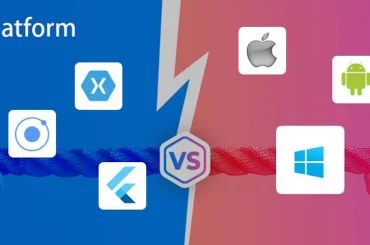Have you recently incorporated your new online app business? Then effective ROI might be your top priority, as you’ve probably made an elementary investment for the development project. Many app businesses like you are choosing the Cross-Platform App Development technique over native or hybrid app development. Because it also requires lesser project investment and brings exceptional ROI. Cross-platform development is easy to conduct and requires single programming language skills from developers.
Even if they’re hired to create the same app for various platforms like iOS, Android, Windows, etc., they can simply create them without learning different programming languages. Apart from various Cross-Platform App Development programming languages, they can use tools and libraries that help build front-end content without using codes. This can surely lower down the total time of project completion and help developers and app owners focus on other essential aspects of the app business.
That’s why modern businesses are running after app development solutions related to Cross-Platform Mobile Development Services. There are also some challenges that the developers may undergo amid creating such apps and maintaining the same. However, in this post, we’ll project the various benefits the modern businesses can draw from such app-building approaches that are leading them to prefer cross-platform frameworks so frequently. Let’s find out!
What is Cross-Platform App Development?
The reason behind the origin of Cross-Platform App Development is diversity. There is two major smartphone OS controlling the market shares globally in the current time- Android and iOS. Therefore, an app business neglecting anyone of the following cannot target ample user traffic and conversion for its online products or services. Cross-platform development helps developers and app owners focus on both mobile operating systems available.
This means more users can get access to the app content and functionality and also share their views and opinion with friends and relatives. In this way, the app business grows slowly over app stores and search engines. However, Cross-Platform Mobile Development Services also bring some challenges to both app owners and developers to face. These challenges include:
- Comparatively low performance
- Over-use of the same codes
- Higher device battery consumption
- Comparatively less efficient
- Server issues
Though these issues are found occasionally, the developers need to stay conscious of their app building and maintenance operations even after the app launch.
Companies Choosing Cross-Platform App Development on Priority
New companies and start-ups are caring about the competition the most. Google Play Store has more than 3 million apps whereas Apple Store has around 2.2 million mobile apps on it. These apps belong to different business niches and cover almost every online business model in them. Cross-Platform App Development simply helps them intensify their business presence over different app stores out there.
In this way, the app companies can grow faster than usual and gain more user recognition. In this segment, we’ll discuss various other reasons behind the popularity of cross-platform apps among modern app companies. Let’s get started:
1. Easy to Maintain
If you’re already running a cross-platform app business you might know what challenges the company has to face after the app launch. The real examination of app performance starts after the app launch. Start-up businesses usually can’t afford a high maintenance cost as they’ve already invested enough in the app development process. Cross-platform apps provide an easy-to-maintain advantage to the app developers and owners.
2. Easy to Deploy
As Cross-Platform Mobile Development Services provide different versions of the same app for multiple OS, the developers don’t face much problem in deploying such apps on various application stores. Delayed deployment can create problems at times if the app company has promoted the products and services ahead of time. Some app companies also share the date of app launch and get in trouble soon.
3. Single Code
Modern companies are in the favor of providing more features with less investment. Cross-platform frameworks can help them achieve the relative app-building objectives very easily. The developers are required to use a single code to write the mobile app for different OS. Hence, the investment in learning and applying multiple languages and tools lower down and the app companies can target added users at the same time.
4. Diversity
The Cross-Platform App Development approach is not limited to a single language. There are many frameworks available offering separate programming language option. That means if your developer team is unable to create a cross-platform app with a particular language, they have options of other frameworks carrying other languages. The top frameworks are- Flutter, React Native, Xamarin, PhoneGap, Ionic, etc.
5. Cheaper
Cross-platform development is surely a cheaper way of building and deploying smartphone apps for different platforms. Plus, the app owners can reach out to a higher target audience. On the other hand, native apps require harder coding and higher programming skills that lead to dedicated app UI and UX. That’s why the performance of native apps is slightly better than the cross-platform apps. However, cross-platform apps still get higher user traffic and attention.
6. Easy Upgrades & More Tools
Cross-platform frameworks come with more tools and techniques that can save a lot of coding time for developers and they can accomplish the app launch way ahead of time. On the other hand, such frameworks come with many easy and frequent updates that are essential for developers to imply to their app-building projects.
Conclusion
Moreover, Cross-Platform App Development frameworks provide better app integration with the cloud and help developers to market the mobile app faster than usual. The mobile app needs to get promoted over different online platforms as soon as possible because most of the apps fail to retain the initial user and consumer groups in the first year of establishment.





